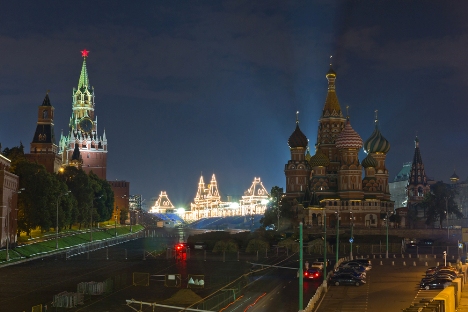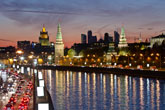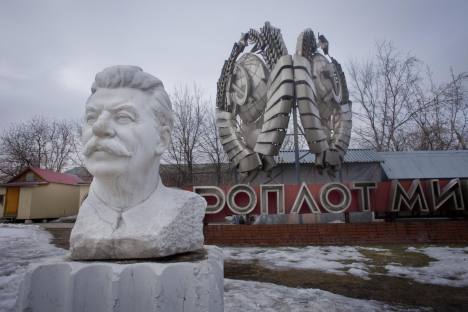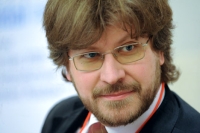A country for people

Russia is clearly entering a new phase in its history – one in which it will have to formulate everything in a new way, whether it wants to or not. Source: Igor Stepanov
I remember there was a huge poster outside my window when I was a child, it read: “All in the name of man, all for the benefit of man.” This omnipresent Soviet slogan remained just words. The decline of the USSR began when its people – for whose benefit everything was ostensibly being done – started to feel increasingly alienated from their own state. When that state was on the verge of vanishing in 1991, nobody rose to its defense. The uniform Soviet identity that seemed to have been created just collapsed, like a house of cards, the moment the bonds of ideology and national security weakened.
True, the old ideology lingered for a while. Russia lived with its aftertaste for over 20 years – the Soviet Union’s disintegration remained the main topic of political debate. The Soviet legacy was coming to an end in ideological, economic and technological terms. Its potential has now been exhausted and the priorities associated with the Soviet and post-Soviet eras engender little more than idle chatter. So, what now? How will the new Russia build its future?
This is a daunting challenge. Russia has to formulate a new national and state identity, build foundations for its development that can respond to different, sometimes contradictory, criteria. Each country has its own historical myth or political interpretation of its history. And Russia’s future identity should reflect its thousand-odd years of incredibly rich, tragic and, crucially, highly diverse history.
It is possible to use Russia’s history as the foundations for a narrative that offers the nation signposts for the future without being too loose with the truth. That said, this desire to anchor Russia in its past should not become an obsession. We should not look to the past for inspiration in everything. Russia’s new mindset should primarily meet the future demands that are just starting to take shape on the horizon.
This brings me back to that old Soviet slogan. Strange as it may seem, that old slogan captures the challenge Russia will have to rise to meet in the second decade of the 21st century quite well.
Russia’s seemingly eternal dilemma lies in the contradictory goals of the state (be it a monarch, the ruling party’s central committee or a group of reformers) and its people. In Russian history, the interests of what the government defines as national development almost always take precedence over the wishes and needs of the individual.
This formula worked in some eras, and even helped bring about social and technological breakthroughs, geopolitical expansion and global status. But projects carried out for the sake of the nation will no longer produce the desired result.
At issue here is not even the morality of treating people as if they are expendable – that does not work in the 21st century. Globalization and openness have put an end to the era of iron curtain and iron fists. It is no longer possible to force people to serve the state or even society. People can only be encouraged to be active and realize their potential in different fields. Victory in this global competition will go to the countries that create the conditions in which people can thrive. These are the countries that attract the best workers.
Let us not forget that Russia will have to make a breakthrough and become a new kind of country despite an unprecedented population shortage. Russia will no longer be a country of unlimited demographic potential. In order to make this leap the country will have to operate a much more efficient social policy, it will have to take better care of its available human capital and increase it by attracting, if possible, the kind of talent it needs to develop.
Why is human capital so important? Competition for talent is becoming the most important form of competition between countries. National security and state interests rely on the ability to offer people the best opportunities for self-realization and the most comfortable environment for living and working.
Related:

Moscow looks to promote business-friendly image
42% of Russians say government cannot improve country – poll
Russia’s inherited dilemma between the state and the individual is now being obliterated by global realities.
In the past, wars determined the hierarchy of nations. Now, massive armed conflicts between great powers are no longer possible, primarily because nuclear weapons have made the potential price to be paid for using force completely unacceptable. Wars are becoming the domain of less-powerful countries involved in local conflicts that have the potential to influence, but not determine, global policy. Second, economic interdependence makes severing ties too costly and dangerous. Only a real emergency could justify this, and even that could prove counterproductive.
Economic competition is moving into the fore, with intellectual and technological leadership playing a key role. The emergence of a new world order has coincided with the transition to the sixth technological mode. Here, it is those people who are capable of delivering intellectual breakthroughs and developing next-generation approaches to production that become the most valuable “commodity.” The battle for brains and talent is intensifying just as the fight for mineral resources once did (this latter is still important, though it is a lower priority).
The appeal that the United States and European countries have for being the most comfortable places to live and work is their competitive advantage, and this is unlikely to change in the foreseeable future. One might even anticipate that the immigration policies of leading Western countries will adapt to create even more incentives to attract the talent needed.
The quality of life and opportunities for creative self-realization available in these countries turn into a tool to extract human capital from countries where conditions are worse, whether through political conflict, economic instability, environmental issues or inconsistent rules of the game.
Although the West has an advantage, it cannot to rest on its laurels. Developing Asian countries with large resource bases are creating conditions that will allow them to attract and retain human capital. China and Singapore have made strides in this direction.
The ability to produce ideas or images and offer them to (impose them on) the rest of the world is also becoming an element in this intensifying global competition. The role of the active segment of society – those who can produce and disseminate these images – is growing. If a state fails to find a common language with the most advanced segment of its own society, this is tantamount to laying delayed-action (or maybe even regular) mines on the path to the future. If a country fails to tap into its own citizens’ potential, other countries will – potentially in a hostile manner.
Opportunistic measures will not accomplish much. Public spending priorities must be reoriented toward science, education and healthcare, although this won’t result in fundamental changes. It is essential to adopt an entirely different approach to achieving development goals and to fundamentally change the approach Russia takes to people.
Russia’s position in this new international context has its advantages and disadvantages. It will be difficult to overcome a tradition that is ill-suited to the demands of the day. However, Russia is used to recovering from disasters, and the country is clearly entering a new phase in its history – one in which it will have to formulate everything in a new way, whether it wants to or not.
Concern for people as the country’s main asset must become a foundation of Russian identity, not for moral or ethical reasons, but for purely pragmatic considerations.
The interests and needs of the state and the people may be aligning for the first time in Russian history, as both now need a strong, confident and comfortable country.
First published in RIA Novosti.
All rights reserved by Rossiyskaya Gazeta.
Subscribe
to our newsletter!
Get the week's best stories straight to your inbox

